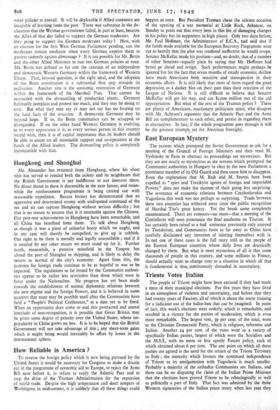How Reliable is America ?
To reverse the foreign policy which is now being pursued by the United States it would be necessary for Congress to make a drastic cut in the programme of economic aid to Europe, to reject the Arms Bill now before it, to refuse to ratify the Atlantic Pact and to stop the drive of the Truman Administration for the expansion of world trade. Despite the high temperature and short tempers of Washington in midsummer, it is unlikely that all these things could happen at once. But President Truman chose the solemn occasion of the opening of a war memorial at Little Rock, Arkansas, on Sunday to point out that every item in this list of damaging changes in his policy has its supporters in high places. Only two days before, Mr. Paul Hoffman, the Administrator of E.C.A., had said that if the funds made available for the European Recovery Programme were cut so heavily that the plan was rendered ineffective he would resign. Senator McKellar made his position—and, no doubt, that of a number of other Senators—equally plain by saying that Mr. Hoffman had better go ahead and resign. Such performances might perhaps be ignored but for the fact that seven months of steady economic decline have made Americans both sensitive and introspective in their economic affairs. It is still likely that most of them regard the great depression as a darker blot on their past than their rejection of the League of Nations. It is still difficult to believe that Senator McKellar will get his way, and cut $1,000 million out of the aid appropriation. But what of the rest of the Truman policy ? There are plenty of Americans, reactionary politicians apart, who disagree with Mr. Acheson's argument that the Atlantic Pact and the Arms Bill are complementary to each other, and persist in regarding them as alternatives. In fact, if the whole programme goes through it will be the greatest triumph yet for American foresight.






































 Previous page
Previous page